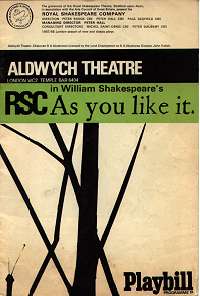
 |
|
Evidently the theatrical question of the year is to be how d'you like your As You Like It? Transvestite, as in the projected National Theatre production this autumn? Mod, as in the cheerful Birmingham Repertory version, which arrived last week in London at the Vaudeville? Or druidical, its woodland less green than sacred, in the new Royal Shakespeare presentation at Stratford? The one thing you can't have, apparently, is As You Like It straight. Its years of Victorian popularity with West End lady-stars have caused a revulsionagainst it by academics and new-wave directors alike. Its written down as second-rate Shakespeare: prosiest of the poetic plays, least comic of the comedies. I suspect myself that this has less to do with the play's actual quality than with our current dominance of directors in the theatre. As You Like It isn't a director's play. It resists tailoring into a single style or idea. For all its hints at a Tempest-like discussion of the ideal Utopia, it never quite arrives there. For all its touches of midsummer-night's magic, it never wholly leaves the ground. All the same, as actors know, it's one of the most theatrical things Shakespeare achieved, working best when the cast are given their heads. |
|
This happens eventually in the second half of David Jones's production, and because Stratford has the better actors it yields marginally the better of the week's two buys.
His first two acts, tracing in powerful imagery the escape of Rosalind, Celia, Orlando and Touchstone from a darkly devious Renaissance court to a winter forest in whose primitive glooms fur-jacketed outlaws raven bloodily after venison, establish impressively that their creator was also the poet of King Lear. They offer little, though, in the way of laughter. By half-time one suspected sinkingly that the house-policy which worked such miracles with The Jew of Malta and Revenger's Tragedy had overreached itself: that we were in for blackness without comedy.
After the interval, however, Tim O'Brien's fallen, revolving tree-trunks put forth some green, and things cheered up. Mainly this was the work of Dorothy Tutin, revealing new finesse as a comedienne. Her Rosalind, looking rather like Tom Sawyer in straw hat and breeches, is a small figure of choirboy bossiness and cheek, forever climbing mossy rocks to lecture her elders on love and collapsing breathlessly into femininity and an inch of Orlando's arms. It's a fraction consciously delicious at moments, but beautifully objectified and timed.
With her lead, Janet Suzman let her wit off leash, making Celia for once her cousin's equal rather than echo. Roy Kinnear's Touchstone, hitherto more buffeted than tart, developed a nice line of grumpy W. C. Fields lechery. The one great success of Jones's approach is Alan Howard's Jaques: a white-faced, haunted apparition of walking pain, whose view of the world is amply justified by the Darwinian jungle of slaughter and mating he finds around him. He reminds you that the part is Shakespeare's signature to the play; but there is no need to make him the whole picture.
Peter Dews's production...............................................................
Ronald Bryden.
The Observer, 18.6.67.